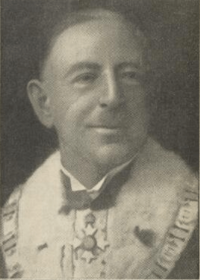Henry Marks facts for kids
Quick facts for kids
Sir Henry Marks
|
|
|---|---|
 |
|
| Member of the Legislative Council | |
| In office 1905–1908, 1911–1929 |
|
| Constituency | Suva |
| Personal details | |
| Born | 5 February 1861 Melbourne, Victoria |
| Died | 5 June 1938 (age 77) |
| Spouse | Annie Abrahams |
| Profession | Businessman |
Sir Henry Marks CBE JP (born February 5, 1861 – died June 5, 1938) was an important businessman and politician in Fiji. He was born in Australia but moved to Fiji when he was 20. For over 20 years, he was a member of the Legislative Council of Fiji, which is like a parliament that helps make laws for the country. He was known as one of the 'big four' who had a lot of influence on Fiji's economy and government in the early 1900s.
Contents
Early Life and Business
Moving to Fiji
Henry Marks was born in Melbourne, Australia, in 1861. His parents, Henry and Mary Marks, were from England. When he was 20 years old, he moved to Fiji.
Starting a Business
He first worked as an import/export trader. This means he bought goods from other countries and sold them in Fiji, and also sold Fijian goods to other countries. Later, he worked as a labour agent. This involved helping people find work in places like New Caledonia, the New Hebrides (now called Vanuatu), and the Solomon Islands.
When he came back to Fiji, he started his own company called Henry Marks & Co. This company was a merchant and commercial agency firm. It dealt with buying and selling goods and providing business services. He was also involved in many other businesses. He led the board at Pacific Insurance and Sturt Ogilvie. He was also a director at other companies like Brown & Joske, Morris Hedstrom, and Fiji Oil Mills.
Family and Military Service
Henry Marks married Annie Abrahams in 1883. They had three daughters and two sons. He also joined the Fiji Volunteer Force when it started in 1898. He began as a captain and later became a Major in 1902. In 1937, he was made an Honorary Colonel of the Fiji Defence Force.
Political Career
Joining the Legislative Council
In 1905, Henry Marks was elected to the Legislative Council of Fiji. This was the first election since 1871. He represented the Suva area. He lost his seat in the 1908 elections. However, he returned to the Council after the 1911 elections. He was then re-elected many times until 1926.
Other Government Roles
While in the Legislative Council, he also served on the Executive Council of Fiji. This council helps the government make important decisions. From 1913 to 1929, he was the Commissioner of Currency. This meant he was in charge of money matters for Fiji. He played a big part in creating the Fijian pound, which was Fiji's currency. Because of his work, his name was even printed on the banknotes for several years.
Henry Marks was also a long-time member of the Suva Municipal Council. This council helps run the city of Suva. He retired from this role in the early 1930s. He also served as the Mayor of Suva from 1926 to 1930.
Later Elections
In 1929, there were some changes to how the Legislative Council worked. Henry Marks ran for the Southern seat in the 1929 elections. However, he was not elected that time.
Helping the Community and Recognition
Philanthropy
Henry Marks was also known for his philanthropy. This means he helped others and gave money to good causes. He donated £5,000 to help start the Colonial War Memorial Hospital in Suva. His company also gave another £5,000. Later, he even donated an x-ray machine to the hospital.
Awards and Knighthood
For his important work and contributions, Henry Marks received special recognition. In 1918, he was made a Commander of the Order of the British Empire (CBE). This is a high honor given by the British government. In 1933, he was knighted. This meant he was given the title of "Sir" before his name, in recognition of his service. Sir Henry Marks passed away in 1938.

